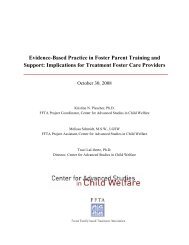Independent Living Program - Florida's Center for Child Welfare
Independent Living Program - Florida's Center for Child Welfare
Independent Living Program - Florida's Center for Child Welfare
- No tags were found...
You also want an ePaper? Increase the reach of your titles
YUMPU automatically turns print PDFs into web optimized ePapers that Google loves.
Progress Report Report No. 10-30DCF has not established an effectivemechanism to ensure that lead agencies meetminimum contract standards <strong>for</strong> independentliving services. The 2006 Legislature requiredDCF via proviso language to incorporateminimum independent living standards intolead agency contracts by July 1, 2007, asrecommended in a 2004 OPPAGA report. 11Further, the Legislature directed the agencyto begin monitoring lead agencyper<strong>for</strong>mance in accordance with theserequirements by Fiscal Year 2008-09. Thesestandards cover a comprehensive array ofservices including life skills, housing,education, and employment. The standardsare intended to better ensure that foster youthreceive the services they need to become selfsufficient and that services are consistentlydelivered throughout the state. However our2007 report noted that the DCF had madelittle progress in developing these standards.DCF has incorporated minimum standardsinto lead agency contracts. However, it doesnot routinely assess whether lead agencyservices meet the standards. Thedepartment’s December 2009 special qualityassurance review of the program concludedthat DCF needed to more frequentlyscrutinize the level and quality of programservices. The report also found widevariations in lead agencies’ processes <strong>for</strong>providing services to youth and young adultsand recommended that DCF set contractrequirements <strong>for</strong> program service delivery.Committee on <strong>Child</strong>ren, Families, and Elder Affairs found thatalthough attention to the needs of 13- to 17-year-old youth hasincreased significantly over the past decade, the servicesintended to help prepare them to live independently uponaging out of the system appear to remain limited andfragmented. The report found that concerns continue to beraised as to whether all eligible youth are being served, andwhether the direction and oversight of community-based carelead agencies and providers are sufficient to ensure that thegoals of the program are being met.11<strong>Independent</strong> <strong>Living</strong> Minimum Standards Recommended <strong>for</strong><strong>Child</strong>ren in Foster Care, OPPAGA Report No. 04-78, November2004.6DCF has collected in<strong>for</strong>mation on programservices, but has not established programoutcome measures as required by law.The2002 Legislature required DCF to developoutcome measures <strong>for</strong> independent livingservices. 12 Our prior report noted that thedepartment had not finalized such measures,although it was working with theDepartment of Education to obtain datarelated to youth with a high school diplomaor GED and young adults enrolled inpostsecondary education.The department still has not establishedsuch measures, although it is collectingin<strong>for</strong>mation on the independent livingservices received by foster youth. While DCFcontracts require lead agencies to meetcontractually specified per<strong>for</strong>mance outcomes<strong>for</strong> other child welfare services, it has not yetestablished contractual outcome standards <strong>for</strong>the <strong>Independent</strong> <strong>Living</strong> <strong>Program</strong>. Suchstandards could cover critical program goalssuch as the percentage of youth served whograduate from high school. DCF managersreport that it has <strong>for</strong>med a workgroup thatincludes department and lead agency staffthat is developing outcome measures <strong>for</strong> theindependent living program. DCF plans toincorporate outcome measures related to the<strong>Independent</strong> <strong>Living</strong> <strong>Program</strong> into leadagency contracts effective July 1, 2010.The department and lead agencies conductan annual survey of youth, young adults,and case workers that could be used to trackper<strong>for</strong>mance towards some key independentliving goals. These surveys include questionson housing arrangements, educational goals,and employment status <strong>for</strong> youth. Beginningin October 2010, the department will alsoparticipate in a federally required survey togather in<strong>for</strong>mation <strong>for</strong> the National Youth inTransition Database; this ef<strong>for</strong>t will collectin<strong>for</strong>mation on youth who are in or who haveaged out of foster care and the services they12Chapter 2002-19, Laws of Florida.
















